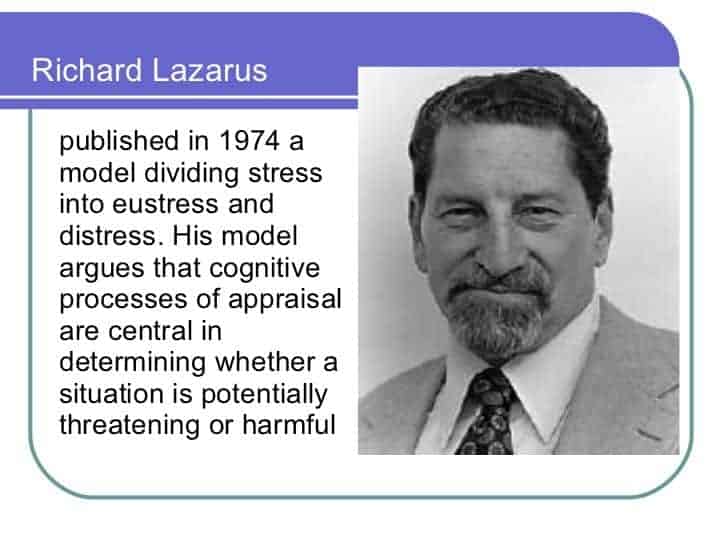What are the 3 elements of Lazarus model of stress?

Richard Lazarus was a prominent American psychologist who entered the mainstream during the 60s at a time when explanations for human behavior were reduced to using basic concepts like reward and punishment. Dr. Lazarus was a psychology professor at the University of California, Berkley and was named among the most influential people in the field. His pioneering works in human emotion and stress relating to cognition make him a very important figure in the field of psychology.
Richard Lazarus Career
Dr. Lazarus graduated from the City College of New York in 1942 before joining the army. He served in the military for 3 years and came back to attend the Pittsburgh University to complete his doctorate in 1948. Dr. Lazarus then joined the faculties of Johns Hopkins University during the same year and of Clark University in 1953. In 1957, he joined the University of California, Berkley as a faculty member where he stayed until becoming professor emeritus in 1991. Lazarus spent his 70s studying coping and stress with a PhD student, Susan Folkman. Soon after, Lazarus and Folkman collaborated and co-authored a book together in 1984 called Stress, Appraisal and Coping. It primarily focused on studying the theory of psychological stress through the lens of coping and cognitive appraisal. Their works made the earliest distinctions between emotion and problem based coping, helping them establish their health consequences both mentally and physically. The book was widely appraised, read and soon become well-cited academic literature. Due to its success, Lazarus worked on its sequel, Stress and Emotion: A New Synthesisand published it in 1999. His 1991 book Emotion and Adaption is one of the most well-known and significant works on human emotion in our recent history. During his whole career, he has published over 150 scholarly articles, papers and around 20 books, praised all around the globe.
What is Richard Lazarus theory?
Lying at the core of Lazarus’s theory is what he referred to as appraisal. According to him, when people face certain situations before experiencing emotion, they make assessments in their subconscious about that situation and how it could affect them or their loved ones. This means, he argued, that emotion is an integral part of human survival. The model he presented uses a way called cognitive appraisal to explain responses to stress or stressful events. According to Dr. Lazarus’s theory, two varying aspects of appraisals must occur in an individual feeling stress in response to an event. These appraisals are stages that are termed by Lazarus as “primary appraisals” and “secondary appraisals.” In primary appraisal, the individual interprets an event as dangerous or threatening to their motives. This is the initial recognition about something’s occurrence, which may or may not affect the individual’s personal objectives. During this cognitive stage, a person realizes whether the outcome of an event is threatening or positive. During the secondary cognitive appraisal, one interprets whether they have the power, ability or resources to be able to respond, coping or fighting, to a particular event. In the third stage, depending upon the situation and after weighing the resources to respond, an individual tries to cope with the event.
Lazarus Theory of Stress and Coping
Richard Lazarus Quotes
The interpretation of stressful events is more important than the events themselves. Richard Lazarus
References
1. Berkeley University of California. Richard Lazarus, UC Berkeley psychology faculty member and influential researcher, dies at 80 . Retrieved August, 2009, from https://berkeley.edu/news/media/releases/2002/12/04_lazarus.html.
Selected Bibliography : Wikipedia .






